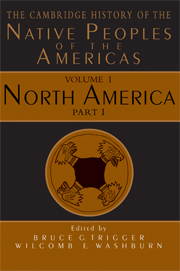Book contents
- Frontmatter
- 1 Native views of history
- 2 Native peoples in Euro-American historiography
- 3 The first Americans and the differentiation of hunter-gatherer cultures
- 4 Indigenous farmers
- 5 Agricultural chiefdoms of the Eastern Woodlands
- 6 Entertaining strangers: North America in the sixteenth century
- 7 Native people and European settlers in eastern North America, 1600–1783
- 8 The expansion of European colonization to the Mississippi Valley, 1780–1880
- Index
- References
2 - Native peoples in Euro-American historiography
Published online by Cambridge University Press: 28 March 2008
- Frontmatter
- 1 Native views of history
- 2 Native peoples in Euro-American historiography
- 3 The first Americans and the differentiation of hunter-gatherer cultures
- 4 Indigenous farmers
- 5 Agricultural chiefdoms of the Eastern Woodlands
- 6 Entertaining strangers: North America in the sixteenth century
- 7 Native people and European settlers in eastern North America, 1600–1783
- 8 The expansion of European colonization to the Mississippi Valley, 1780–1880
- Index
- References
Summary
The greatest problem confronting scholars in researching the history of Native Americans is that the written sources for that history derive largely from the non-Native side and are subject to the distortions, misconceptions, biases, and ignorance that are generally associated with history seen from an external cultural perspective. Moreover, the nature of those biases and distortions has varied over the centuries, so that the data from which the historian must draw need to be interpreted with an understanding of those changes. In addition, Native American history shares all the problems of history in general, which, as the British historian Christopher Hill has observed, is rewritten by every generation, not because the past has changed but because each generation asks different questions about it. As a result, historical writing often reveals as much about historians and their social milieu as it does about the objects of their study.
Our knowledge of American Indian history does not depend only on written sources. Oral history, although full of pitfalls, has demonstrated that even through the veil of centuries the Native American past can sometimes be recaptured by the diligent and sensitive researcher. Archaeology is providing increasingly sophisticated evidence about indigenous societies from the earliest appearance of human beings in the New World until the beginning of written records. For more recent times it supplements in many important ways the historical record of changes in Native life as well as providing new insights into specific events, such as the Battle of the Little Bighorn. Nevertheless, the interpretation of archaeological data has limitations and biases that are no less significant than those of written records.
- Type
- Chapter
- Information
- The Cambridge History of the Native Peoples of the Americas , pp. 61 - 124Publisher: Cambridge University PressPrint publication year: 1996
References
- 4
- Cited by

